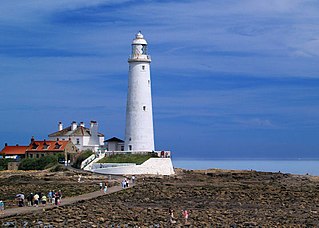
The "Londonderry Air" is an Irish air that originated in County Londonderry, first recorded in the nineteenth century. The tune is played as the victory sporting anthem of Northern Ireland at the Commonwealth Games. The song "Danny Boy" written by English lawyer Fred Weatherly uses the tune, with a set of lyrics written in the early 20th century.

North Tyneside is a metropolitan borough in the metropolitan county of Tyne and Wear, England. It forms part of the greater Tyneside conurbation. North Tyneside Council is headquartered at Cobalt Park, Wallsend.

North Shields is a town in the borough of North Tyneside in Tyne and Wear, England. It is 8 miles (13 km) north-east of Newcastle upon Tyne and borders nearby Wallsend and Tynemouth.
Here Northumbria is defined as Northumberland, the northernmost county of England, and County Durham. According to 'World Music: The Rough Guide', "nowhere is the English living tradition more in evidence than the border lands of Northumbria, the one part of England to rival the counties of the west of Ireland for a rich unbroken tradition. The region is particularly noted for its tradition of border ballads, the Northumbrian smallpipes and also a strong fiddle tradition in the region that was already well established in the 1690s. Northumbrian music is characterised by considerable influence from other regions, particularly southern Scotland and other parts of the north of England, as well as Irish immigrants.
"The Water Is Wide" is a folk song of British origin. It remains popular in the 21st century. Cecil Sharp published the song in Folk Songs From Somerset (1906).

"The Great Silkie of Sule Skerry" or "The Grey Selkie of Sule Skerry" is a traditional folk song from Orkney and Shetland. A woman has her child taken away by its father, the great selkie of Sule Skerry which can transform from a seal into a human. The woman is fated to marry a gunner who will harpoon the selkie and their son.

"Wade in the Water" is an African American jubilee song, a spiritual—in reference to a genre of music "created and first sung by African Americans in slavery."
"Dink's Song" is an American folk song played by many folk revival musicians such as Pete Seeger, Fred Neil, Bob Dylan, Joan Baez, Dave Van Ronk, Kate & Anna McGarrigle, and Cisco Houston as well as more recent musicians like Jeff Buckley. The song tells the story of a woman deserted by her lover when she needs him the most.
"The Keel Row" is a traditional Tyneside folk song evoking the life and work of the keelmen of Newcastle upon Tyne. A closely related song was first published in a Scottish collection of the 1770s, but may be considerably older, and it is unclear whether the tune is Scottish or English in origin.
"Blow the Wind Southerly" is a traditional English folk song from Northumbria. It tells of a woman desperately hoping for a southerly wind to blow her lover back home over the sea to her. It is Roud number 2619.
"Cushie Butterfield" is a famous Geordie folk song written in the 19th century by Geordie Ridley, in the style of the music hall popular in the day. It is regarded by many as the second unofficial anthem of Tyneside after Blaydon Races.
"Buy Broom Buzzems" is a song attributed by many to William Purvis, probably better known as "Blind Willie" (1752–1832), a Tyneside songwriter and performer in the end of the 18th and start of the 19th century, and is considered by many to be his piece de resistance.
The Pitman's Courtship is a famous Geordie folk song written in the 19th century by William Mitford, in a style deriving from music hall. This piece takes a humorous look at the courtship of a Pitman and his lass where the discussion forms the proposal of marriage and the couple's plans for a life together. This song was generally considered to be one of the region's finest 'traditional' songs, one of only a handful of Tyneside songs to be appreciated outside the region in its day.
Jemmy Joneson's Whurry is a traditional Geordie folk song in Geordie dialect written circa 1815, by Thomas Thompson, in a style deriving from music hall.
"Geordy Black", also known as "Geordie Black" and "I'm Going Down the Hill" is a 19th-century Geordie folk song by Rowland "Rowley" Harrison, in a style deriving from music hall.

Eric Boswell was an English composer of popular songs and folk music, most famous for writing the children's Christmas song "Little Donkey".
The Pitman's Revenge is a traditional Geordie folk song, written circa 1804, by George Cameron in the Geordie dialect. The song is about the threat of invasion posed by Napoleon Bonaparte.
"The Cliffs of Old Tynemouth" is a Geordie folk song written in the 19th century by David Ross Lietch. This song is a ballad, romanticising about one of the tourist sights of the Tyneside area.
"The Cullercoats Fish Lass" is a folk song, written by Edward Corvan, originally printed as a broadside in 1862 and collated in Allan's Illustrated Edition of Tyneside Songs and Readings in 1891.







